MercoPress. South Atlantic News Agency
Tag: Patagonian squid
-
Thursday, January 30th 2025 - 11:35 UTC
Argentina launches a month assessment of Illex squid along the Patagonian shelf
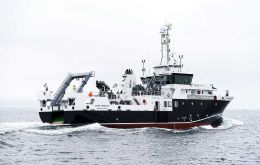
Argentina this week launched a month long cruise assessment of the sub-Patagonic squid, Illex Argentinus, on board the Ocean Fisheries Research Vessel, Victor Angelescu. The area of research will extend between parallels 46 and 51 degrees south.
-
Thursday, April 25th 2024 - 05:32 UTC
Argentines satisfied with this year's squid catches, “higher than expected”
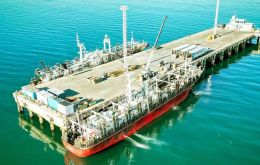
Landings of squid in Puerto Madryn, Chubut province, Argentine Patagonia are higher than last year's and can be considered a “great success for fisheries and our province,” according to Diego Pérez, manager of the Madryn port.
-
Friday, April 24th 2020 - 08:45 UTC
Falklands faces fishing markets paralyzed on COVID-19 impact

The impact of COVID-19 on the seafood market and industry operations has been severe, confirmed fishing industry executives and a spokesperson for the Falkland Islands Fishing Companies Association (FIFCA).
-
Friday, October 3rd 2014 - 23:34 UTC
Squid, hake and shrimp make up most of Argentine fisheries exports

Argentina exported 277.348 tons of seafood between January and August 2014, which represents a minimum rise of 0.01% compared to the 277.314 tons of the same period in 2013.
-
Tuesday, September 16th 2014 - 05:36 UTC
Argentine seafood exports up 3.9% in value and 3% in volume in first half of 2014
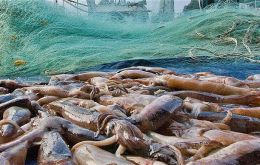
In the first half of this year, Argentina seafood exports totaled 778.8 million dollars with a slight increase of 30 million dollars, and 3.9% over the same period of 2013 (749.6 million), reported the Directorate of Fisheries Economics from the Fisheries and Aquaculture Under Secretariat.
-
Monday, March 17th 2014 - 20:09 UTC
Squid landing in Argentina in 2.5 months, lower than 2013, but still 'acceptable'
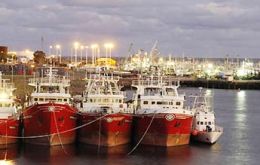
According to the latest stats from the Argentine Fisheries Under-Secretariat Office, between January first and 13 March, 2014, a total of 31,760.6 tons of squid (Illex argentinus) was landed in Argentine ports. Out of that volume, 213.3 tons correspond to January; 26,391.9 tons to February and in the first two weeks of March, 5,155.3 tons.
-
Thursday, October 24th 2013 - 21:13 UTC
Pescanova 'faked' annual turnover in 2011 and 2012 by 80%, says KPMG audit
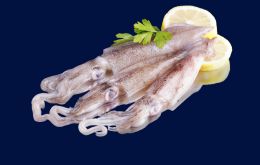
The auditing firm KPMG found out that the Galician multinational firm Pescanova ‘blew up’ up to 1,264% the price of seafood products sold to the 14 instrumental (straw) companies with which it operated through fake invoices.
-
Thursday, May 2nd 2013 - 07:50 UTC
Argentina’s seafood exports in two months: 48.418 tons; lower prices for hake, squid and shrimp

Argentina reported exports of 48.418 tons of seafood in the first two months of the year equivalent to 140.8 million dollars, which is 8.2% less than the same period a year ago, mainly because of lower prices.
-
Tuesday, April 30th 2013 - 19:03 UTC
Falklands’ companies receive ‘Superior Taste Award’ for Islands’ squid in Brussels seafood fair

Two Falkland Islands fishing companies were awarded in Brussels last week the Superior Taste Award which was extended to Marfrío a Spanish processing company that works with Patagonian squid caught in the Islands waters.
